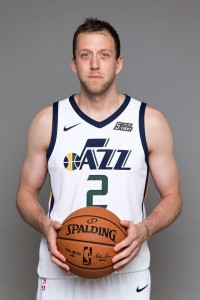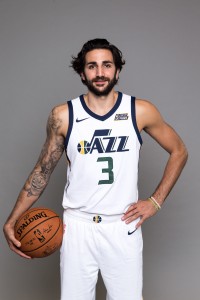Hoops Rumors is breaking down the 2017 offseason for all 30 NBA teams, revisiting the summer’s free agent signings, trades, draft picks, departures, and more. We’ll evaluate each team’s moves from the last several months and look ahead to what the 2017/18 season holds for all 30 franchises. Today, we’re focusing on the Utah Jazz.
Signings:
- Joe Ingles: Four years, $50MM.
- Thabo Sefolosha: Two years, $10.5MM. Second year non-guaranteed.
- Jonas Jerebko: Two years, $8.2MM. Second year non-guaranteed.
- Ekpe Udoh: Two years, $6.5MM. Second year non-guaranteed.
- Royce O’Neale: Three years, minimum salary. Second and third years non-guaranteed.
- Eric Griffin: Two-way contract. One year. $50K guaranteed.
- Nate Wolters: Two-way contract. One year. $50K guaranteed.
Camp invitees:
- Taylor Braun: One year, minimum salary. Exhibits nine and 10. (Waived)
- Naz Mitrou-Long: One year, minimum salary. Exhibits nine and 10.
- Torian Graham: Exact details not yet known.
Trades:
- Acquired the draft rights to Donovan Mitchell (No. 13 pick) from the Nuggets in exchange for Trey Lyles and the draft rights to Tyler Lydon (No. 24 pick).
- Acquired the draft rights to Tony Bradley (No. 28 pick) from the Lakers in exchange for the draft rights to Josh Hart (No. 30 pick) and Thomas Bryant (No. 42 pick).
- Acquired Ricky Rubio from the Timberwolves in exchange for the Thunder’s 2018 first-round pick (top-14 protected).
Draft picks:
- 1-13: Donovan Mitchell — Signed to rookie contract.
- 1-28: Tony Bradley — Signed to rookie contract.
- 2-55: Nigel Williams-Goss — Stashed overseas.
Departing players:
- Boris Diaw (waived)
- Gordon Hayward
- George Hill
- Trey Lyles
- Shelvin Mack
- Jeff Withey
Other offseason news:
- Hired David Morway and Justin Zanik as assistant general managers.
Salary cap situation:
- Used cap room; now operating over the cap, but under the tax. Carrying approximately $110MM in guaranteed salaries. Approximately $1.128MM of room exception still available. Otherwise, only minimum salary exception available.
Check out the Utah Jazz’s full roster and depth chart at RosterResource.com.
Story of the summer:
There’s no denying that Utah’s biggest priority heading into the summer was to retain the services of Gordon Hayward, a free agent after seven seasons with the Jazz. Alas, the Butler product left the only NBA franchise he ever knew to reunite with former Butler head coach Brad Stevens as a Celtic.
While the Jazz may have been devastated by the move, they weren’t blindsided, and they ended up stringing together an offseason with upsides that ease the pain of their All-Star’s exit.
Hayward was an excellent asset for the Jazz, but Rudy Gobert and the system installed by coach Quin Snyder have been equally important to the franchise’s recent success. With a host of compelling young players eager to develop and take advantage of a newfound opportunity, 2017/18 may not be so bad after all.
Key offseason losses:
Despite the fact that he was the biggest name on the only professional sports team in Salt Lake City, Hayward was not a deity. His absence will inevitably be felt on offense, but last season was the forward’s first exceeding the 20-point-per-game plateau. While Hayward is an excellent shooter – particularly impressive considering the attention he attracted and his volume – his contributions are ultimately replaceable.
Another loss that will be felt is that of George Hill. The veteran guard thrived in his lone season with Utah, at least when he was healthy. However, he couldn’t resist the pile of money that the Kings threw at him, desperate for somebody to babysit their rookies.
Given the losses of Hayward and Hill, it’s not surprising that the Jazz parted ways with Boris Diaw as well. The 34-year-old had been parachuted in to help provide experience and leadership to the upstart playoff contender, but won’t be required as the club retools for the future.
While Trey Lyles didn’t exactly impact many games during his first two seasons in Utah, there’s something intriguing about the 21-year-old former 12th overall pick. Following a trade that sent him to the Nuggets, Lyles may benefit from the change of scenery in Colorado, but his greatest contribution to the Jazz was helping them land the pick that yielded Donovan Mitchell.
The Jazz also shed some reliable, if inconsequential, reserves in the form of Jeff Withey and Shelvin Mack, both of whom will ply their trade as glue guys for other organizations in 2017/18.
Key offseason additions:
The Jazz got their hands on a genuine playmaker in Ricky Rubio this summer and all they had to give up was Oklahoma City’s 2018 first-rounder, which figures to land in the mid-20s. The deal became particularly important when Hill subsequently signed on in Sacramento, leaving Rubio as the unquestioned starter in Utah. Rubio’s six years with the Timberwolves all feel hazy and stagnant, but his ability to create for teammates is top notch and his notoriously wonky jump shot has improved.
The Jazz came away with a potential steal in 13th overall pick Mitchell on draft day. The two-way guard has impressed in NBA circles with his athleticism and may be able to contribute to Utah in his rookie season. The franchise will be on the lookout for new offensive leaders and Mitchell will get a fair crack to emerge as one.
The signing of Ekpe Udoh, a 30-year-old who has been out of the NBA since 2014/15, may not initially appear to move the needle all that much, but the veteran and international star will complement franchise cornerstone Rudy Gobert well in 2017/18. Udoh’s length makes him formidable on defense.
Another imported defensive specialist who will suit up for Utah this season is Thabo Sefolosha. The forward will be one of Utah’s many options at the three after having made a name for himself locking down opponents with the Hawks and Thunder.
Outlook for 2017/18:
The Jazz didn’t waste time retooling after Hayward announced his intentions to sign in Boston, and the results speak for themselves. The depth of this team is at least as impressive as it was last season, and a roster littered with veterans will serve the franchise well in a punishingly competitive Western Conference.
Priority No. 1 for the squad will be finding a new leading scorer. With players like Rodney Hood and Mitchell already aboard, it may simply be a matter of letting them make the most of their opportunities.
New scoring threat or not, however, Utah’s culture has very much been defined by the defensive presence of Gobert and that’s not just a new thing now that Hayward is out of the picture.
The fact that Jazz general manager Dennis Lindsey has been able to pack the cracks of Utah’s core with additional defensive specialists makes this as scary a team as ever. They may not crack the 50-win plateau as they acclimate to a slightly retooled core, but the playoffs are well within reach for a second consecutive season.
Salary information from Basketball Insiders used in the creation of this post. Photos courtesy of USA Today Sports Images. Luke Adams contributed to this post.

RosterResource has Ingles starting at the 3, Hood at the 2. Good for Utah but bad for my prediction of Mitchell as steal of the draft.
Apart from loosing Hayward they have made pretty decent signings and trades